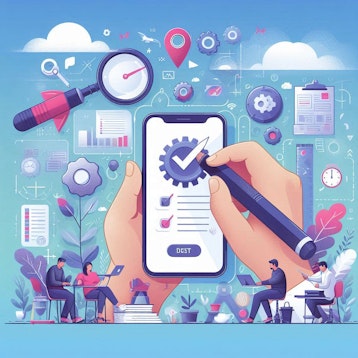Introduction to AI for Small Businesses
How can small businesses harness the transformative power of Artificial Intelligence (AI) to not only compete but thrive in today's digital age? Artificial Intelligence (AI) has evolved beyond being an abstract concept to becoming a tool small businesses are increasingly adopting. At its core, AI involves using computer systems to perform tasks that normally require human intelligence.
AI applications provide businesses with a powerful asset that is capable of understanding natural language, recognizing patterns, and making decisions based on data to predict future trends. Integrating AI into operations is often seen as game-changing for small business owners, much like our SaaS AI-based web App project showcases.
Your application provides the power to optimize processes, strengthen customer interactions, and unlock insights from previously inaccessible data sources. Artificial Intelligence can unlock new avenues of growth and efficiency for small businesses, as demonstrated by the innovative solutions provided by our AI Design Agency Artificial Intelligence can unlock new avenues of growth and efficiency for small businesses.
By demystifying AI's potential uses and understanding its potential applications, as detailed in our AI UX Design Review, small businesses can better position themselves to compete more effectively in today's digital landscape while making the most of resources and seizing new opportunities.
Benefits of AI for Small Businesses
Artificial Intelligence (AI) provides businesses looking to streamline their operations with a powerful asset that simplifies complex processes: Artificial Intelligence. AI includes tools and systems designed to simulate human intelligence; these may range from data analysis to automated customer service - offering small business owners many benefits that can significantly change their competitive landscape.
Efficiency and Automation: "AI excels at automating repetitive tasks, saving businesses countless hours, as demonstrated by UiPath, a leader in Robotic Process Automation in which their human resources can be allocated to more strategic endeavors - cutting both labor costs and increasing operational efficiency simultaneously.
Better Customer Experiences: Chatbots powered by AI provide 24/7 customer service, ensuring instantaneous responses to inquiries and support requests, increasing customer satisfaction and loyalty by handling queries promptly and efficiently.
Data-Driven Insights: Small businesses often struggle with processing large volumes of data. AI comes to their aid by sorting through it all to identify trends, preferences, and buying patterns - insights that are vital for shaping marketing strategies, optimizing product offerings, and making informed decisions that drive growth.
Personalized Marketing: AI's capacity to process and analyze customer data enables highly tailored marketing efforts, raising questions like those discussed in Will AI Replace UX Designers? By understanding individual customer behaviors and preferences, businesses can develop targeted campaigns that drastically increase engagement rates while increasing ROI.
Competitive Edge: In an industry dominated by large companies, AI levels the playing field for smaller enterprises. By adopting AI technologies, smaller enterprises can provide services and experiences that distinguish themselves against their larger rivals - giving them a competitive advantage against larger corporations.
Risk Management: AI tools can use predictive analysis to anticipate market changes and recognize risks early, giving small businesses time to adapt their strategies quickly to mitigate any unforeseen threats to their operations.
Adopting AI doesn't require large investments or in-depth technical knowledge - many tools and applications designed for small businesses provide user-friendly, scalable solutions. By starting small and gradually adding more AI tools into operations, small businesses can reap its advantages without overburdening existing processes.
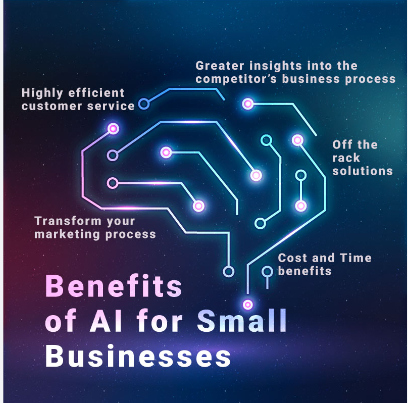
3 Practical Applications of AI in Small Businesses
In the Practical Applications of AI in Small Business section, we explore how AI can significantly enhance various aspects of small business operations. This includes personalizing marketing efforts to meet customer preferences, utilizing AI-powered chatbots for round-the-clock customer service, and applying AI for more accurate financial forecasting and analysis.
Marketing with AI
AI revolutionizes marketing by offering personalized experiences to customers. For instance, AI algorithms analyze customer data to predict buying habits and preferences, enabling businesses to send targeted emails that resonate with each recipient. Tools like HubSpot use AI to segment audiences and tailor content, increasing open rates and conversions.
Social media platforms leverage AI to optimize ad placements, ensuring that promotional content reaches the most relevant audience. AI also aids in content creation, with tools like Jasper AI generating blog posts, social media content, and more, saving time and resources while maintaining a high level of engagement.
Customer Service Improvements
AI significantly enhances customer service capabilities, and similarly, it revolutionizes recruiting, as our article on AI Tools for Recruiting explains. Chatbots, like those powered by platforms such as Intercom or Drift, offer immediate responses to customer inquiries, providing a seamless experience even outside of business hours.
These AI systems can handle a wide array of questions, from basic product information to complex troubleshooting, learning from each interaction to improve future responses. For small businesses, this means offering personalized, efficient customer service without the need for a large support team, freeing up resources for other areas of the business.
Financial Management Through AI
Financial management is another critical area where AI can bring about transformation. AI tools analyze historical financial data to forecast future trends, assisting in more accurate budgeting and financial planning. Platforms like Xero and QuickBooks leverage AI for invoice processing and expense categorization, reducing manual entry errors and providing real-time insights into financial health. Additionally, AI-driven analytics can uncover cost-saving opportunities and revenue-generating strategies, guiding small businesses toward better financial decisions.
Integrating AI into these areas not only streamlines operations but also provides small businesses with insights, a shift further explored in AI UX Research Trend . and efficiencies that were previously only accessible to larger corporations. By embracing AI, small businesses can stay competitive, agile, and responsive to changing market dynamics, a trend well-documented among AI Startups
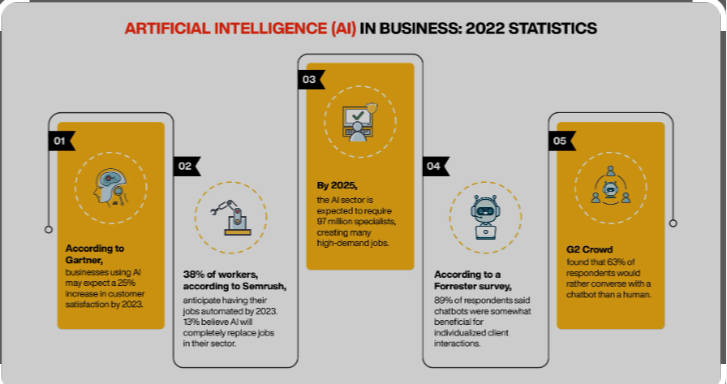
Top 5 AI Tools for Every Small Business:
The world of AI can seem complex, but there are many user-friendly tools available to help small businesses. Here are 5 of the best AI tools small businesses can leverage for productivity, explained simply:
AI Writing Assistant Tools:
These tools help you create high-quality content, like social media posts, blog articles, and even ad copy. They use AI to suggest ideas, improve grammar, and ensure a consistent tone.
Key features:
Content generation: These tools use AI to write different kinds of content for you, like blog posts, product descriptions, and email drafts. You provide some basic information, and they generate text to get you started.
Grammar and style checking: Like extra-smart spellcheckers, they catch typos, suggest better phrasing, and make sure your writing is polished and error-free.
Plagiarism detection: They can compare your writing to vast amounts of text online to make sure your content is original and not accidentally copied.
Benefits
Saves time and resources: You don't have to spend hours staring at a blank page; an AI assistant helps get words flowing!
Improves content quality: Even experienced writers benefit from having an AI editor to help refine their work.
Helps with writer's block: Need a spark of inspiration? These tools can provide ideas to overcome that creative block.
Example:
Jasper AI: Great for marketing copywriting and long-form content like blog posts. Integrating AI into operations is often seen as game-changing for small business owners, and platforms like Jasper AI have made content creation easier and more efficient for entrepreneurs.
Writesonic: Excels at generating short product descriptions, landing pages, and ad text.
Rytr: Offers a budget-friendly option with lots of useful features.
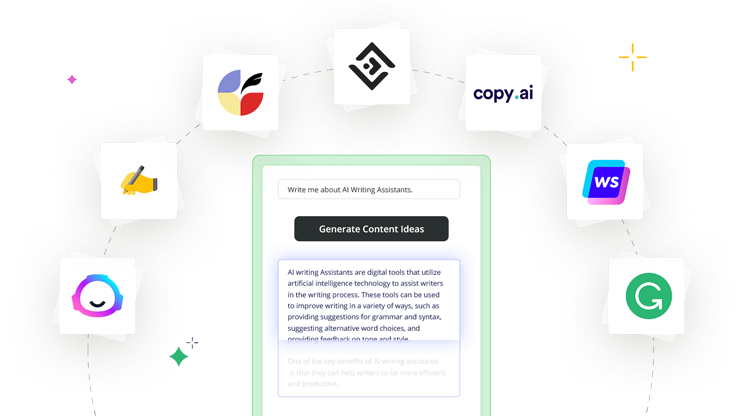
AI Writing Assistants streamline the content creation process, making it easier for businesses to maintain a consistent and engaging online presence, as further explained in our guide on How to Use ChatGPT 4
2. AI Project Management Tools
Key Features:
Task management: Break projects into bite-sized tasks, set deadlines, and see everything in one place.
Communication tools: Comment on tasks, share files, get updates – no more messy email threads!
Progress tracking: Visualize the status of your project—what's done, what's next, and are you on track?
Resource allocation: AI can suggest the best team members for tasks and help avoid overloading anyone.
Benefits:
Improves team collaboration: Everyone's on the same page, reducing confusion and wasted effort.
Boosts productivity: Avoids delays by identifying potential issues and suggesting efficiency improvements.
Helps avoid missed deadlines: Proactive scheduling reduces last-minute stress and missed targets.
Examples:
ClickUp: Offers tons of customizable AI features and templates to streamline workflows.
Asana: A popular choice with a focus on visual task management and team communication.
Trello: A classic option known for its simple, card-based task organization.
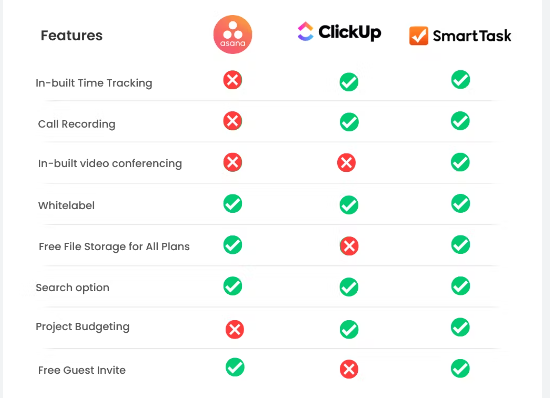
3. AI Social Media Management Tools
Key Features:
Post scheduling: Write posts ahead of time and have them automatically published at the best time for engagement.
Analytics and reporting: Track how posts perform (likes, shares, etc.) and get insights into your audience.
Social listening: Track what people are saying about your brand online, so you can respond and understand customer sentiment.
Content suggestion: Some tools use AI to help you find interesting articles or topics to share.
Benefits:
Saves time and effort: Automate repetitive tasks and focus on interacting with your audience.
Helps you reach a wider audience: Identify the best times to post and optimize content for engagement.
Improves social media engagement: Helps you create more interesting posts and respond to customers effectively.
Examples:
Hootsuite: A comprehensive suite for managing multiple social accounts, including scheduling and analytics.
Buffer: Easy-to-use scheduling tool with a focus on analytics and reporting.
Sprout Social: Offers advanced analytics, listening, and tools for larger teams.
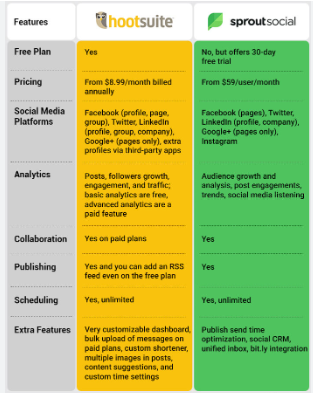
4. AI Customer Service Chatbots
Key Features:
Answers frequently asked questions: Program your chatbot to handle common inquiries like store hours or shipping info.
Provides basic troubleshooting steps: Helps customers with simple problems, freeing up human support staff.
Collects customer feedback: Can ask for ratings and collect valuable feedback to improve your business.
Benefits:
Improves customer satisfaction: Customers get answers quickly, even outside of business hours.
Reduces support costs: Chatbots handle many simple questions, so staff can focus on complex issues.
Provides 24/7 availability: Customers can find help instantly, no matter the time zone.
Examples:
Manychat: Popular for building chatbots for Facebook Messenger.
Drift: Great for conversational chatbots and sales interactions.
Zendesk: Comprehensive customer service platform including chatbots and more.
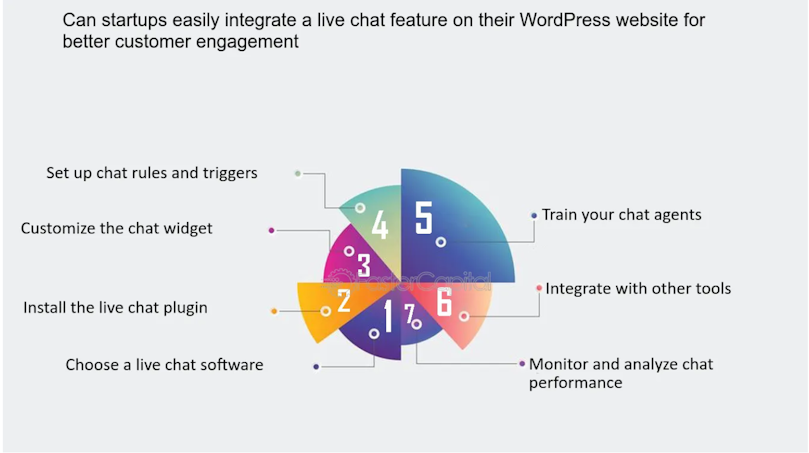
5. AI Design Tools
Key Features
Logo Generation: Create custom logos using AI-powered suggestions based on your brand name and industry.
Mockup Creation: Generate mockups for websites, apps, and even physical products.
Image Editing: Simple edits like removing backgrounds, resizing, and adjusting colour balance.
Colour Scheme Suggestions: AI-generated colour palettes that work together harmoniously.
Benefits
Cost-Effective Design: Affordable alternative to hiring a professional designer.
Faster Design Process: Quickly generate concepts and make iterations on the fly.
Beginner-friendly: Easy to use with no prior design experience required.
Examples
Canva: Popular for its vast library of templates and an intuitive drag-and-drop interface.
Adobe Spark: Integrated with Adobe's suite of creative tools, offers more advanced capabilities.
DesignEvo: Specializes in logo creation and design customization.
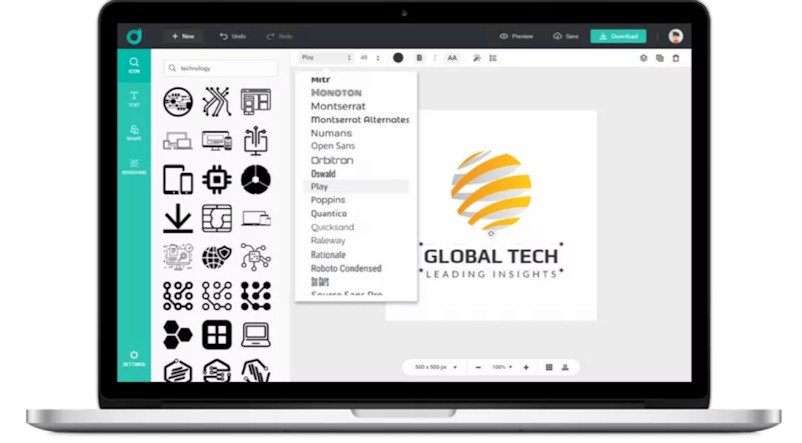
Implementing AI in your small business
Implementing AI in your small business efficiently involves starting with manageable, impactful changes and tackling common obstacles thoughtfully:
Starting Small
Identify Immediate Needs: Begin by identifying processes that can benefit most from automation or AI enhancement, such as customer service or data analysis.
Choose User-Friendly Tools: Opt for AI tools that offer straightforward integration and user-friendly interfaces to ease the transition for your team.
Implement Gradually: Roll out AI tools in phases, allowing time for your team to adapt and for you to assess the impact on your operations.
Overcoming Common Challenges
Budget Constraints: Leverage free or low-cost AI tools with scalable options. Many AI platforms offer basic free tiers that are suitable for small businesses.
Staff Training: Invest in training resources or workshops to upskill your team. Many AI tool providers offer training materials or online courses to help users get the most out of their products.
Integration with Existing Systems: Choose AI solutions that can easily integrate with your existing software to avoid disruption and ensure a smoother transition.
By focusing on these strategies, small businesses can effectively navigate the initial stages of AI integration, enhancing efficiency and paving the way for more advanced applications as their confidence and capabilities grow.
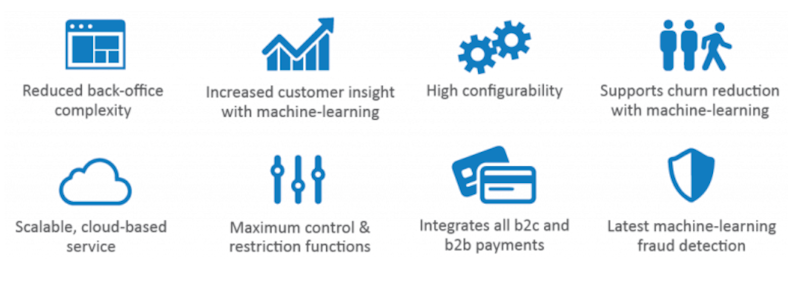
Inspiring Success Stories
1. The Boutique Retailer and Chatbots: A small boutique struggling with high customer inquiry volumes integrated an AI chatbot into their website. This improved response times and personalized shopping experiences, leading to a 30% increase in online sales. The lesson: Automating customer service can significantly enhance customer satisfaction and sales.
2. The Local Bakery and AI-Driven Marketing: By utilizing AI for data analysis, a local bakery identified key customer trends, allowing them to tailor their marketing campaigns effectively. Resulting in a 50% boost in engagement on social media and a 25% increase in foot traffic. The bakery learned the power of targeted marketing with AI in understanding and engaging its audience more effectively.
3. The Independent Consultant and Project Management Tools: An independent consultant used AI-powered project management tools to streamline project timelines and resource allocation. This led to a 40% reduction in project delivery times and a noticeable improvement in client satisfaction. The consultant discovered the efficiency of using AI to manage projects and resources better.
These stories underscore the transformative impact of AI across various small business operations, emphasizing the importance of strategic AI tool selection, the value of training, and the benefits of phased integration.
Conclusion
Embracing AI offers small businesses a path to transform operations, enhance customer interactions, and unlock new growth avenues. The journey to AI integration begins with identifying specific needs, selecting user-friendly tools, and committing to gradual implementation. The success stories of others serve as a testament to the potential that AI holds. Whether it's through improving efficiency, personalizing marketing, or streamlining customer service, the benefits are tangible and significant. Let these stories inspire you to take the first step toward integrating AI into your business.
The future is here, and it's powered by AI. Embrace it with an open mind and a strategic approach to discover the full extent of what your business can achieve. To integrate the suggested internal links into the complete blog effectively, let's modify specific sentences to include these links naturally, enhancing the article's value and providing readers with additional resources.


